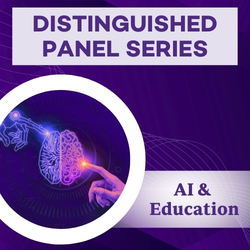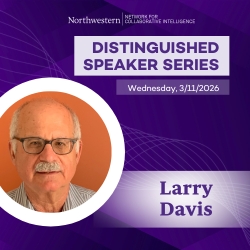Events
NNCI Distinguished Panel - Featuring Sean Mooney, Moderated by Kristi Holmes
Northwestern Network for Collaborative Intelligence (NNCI)
12:00 PM
//
McCormick Auditorium, Norris University Center
Details
Join us for an in-person Distinguished Panel event featuring Sean Mooney, Director of the Center for Information Technology at NIH, moderated by Kristi Holmes.
Title: "TBD"
[Abstract]
Lunch will be provided. Registration is required.
Time
Tuesday, April 7, 2026 at 12:00 PM - 1:30 PM
Location
McCormick Auditorium, Norris University Center Map
Calendar
Northwestern Network for Collaborative Intelligence (NNCI)
"AI & The Future of Education" Featuring, Moderated by Karen Smilowitz
Northwestern Network for Collaborative Intelligence (NNCI)
12:00 PM
//
Chambers Hall
Details

Join us for an in-person Distinguished Panel event featuring NNCI's new Education Pillar Leads, ___________ & ____________, moderated by Karen Smilowitz.
Title: "AI & The Future of Education"
Higher education is at an inflection point. As artificial intelligence rapidly reshapes how we teach, learn, and conduct research, universities face pressing questions about what this means for students, faculty, and institutions alike.
This panel brings together thought leaders from Northwestern to explore how AI is transforming the higher education landscape — from the classroom to the research lab. Panelists will discuss the opportunities and challenges AI presents for learning outcomes, academic integrity, institutional governance, and the evolving roles of educators and students. The conversation will also consider how universities can thoughtfully adapt to ensure AI serves as a tool for equity and excellence rather than a source of new inequities.
Lunch will be provided. Registration is required.
Time
Tuesday, April 21, 2026 at 12:00 PM - 1:30 PM
Location
Chambers Hall Map
Calendar
Northwestern Network for Collaborative Intelligence (NNCI)
"Fun with Fashion" - Larry Davis
Northwestern Network for Collaborative Intelligence (NNCI)
12:00 PM
Details

Join us for an in-person Distinguished Speaker event featuring Larry Davis, a leading figure in computer vision and artificial intelligence whose influential academic career and recent industry innovations at Amazon have helped shape modern approaches to visual understanding and generative media.
Title: "Fun with Fashion"
Abstract: More than 100,000,000 customers shop for clothing online at Amazon annually in the United States alone. The fashion catalogue is enormous and changes with high velocity as new styles are introduced and older items either go out of fashion or out of stock. Customers are challenged to find clothing that fits their style and their bodies at a price that fits their budgets. The Amazon Fashion science team addresses these challenges through the design and development of new machine learning and computer vision models that help customers navigate the catalog and efficiently evaluate items Amazon is recommending to them. The talk will discuss solutions the team has developed to problems including virtual try on (what will this garment look like on me?), complementary recommendations (how do I style this garment?) and size recommendations (what size, if any, of this garment will fit me?), emphasizing the challenges introduced by the need to have scalable solutions.
Lunch will be provided. Registration is required.
Larry Davis is a Senior Principal Scientist in Amazon’s Fashion and Fitness organization. He joined Amazon in 2018 after a long career in academics. At Amazon he worked on introducing novel customer experiences for fashion shopping like outfit builder (based on complementary recommendations) and virtual try on. He led Amazon’s first GenAI team for image and video synthesis, developing models to diversify the catalogue to make it more relatable for our customers. . He received his Ph. D. from the University of Maryland in 1975 and from 1977-1981 was an Assistant Professor of Computer Science at the University of Texas in Austin. He returned to the University of Maryland in 1981 and was the founding Director of the University’s Institute for Advanced Computer Studies (1985-1994). He also served as Chair of the Department of Computer Science from 2000-2012. Larry retired from the University in 2021 and is now a Professor Emeritus and a College Park Professor. He advised more than 75 Ph. D. students at Texas and Maryland. His work spanned many aspects of computer vision, including applications in visual navigation, robotic vision, media forensics, remote sensing,fashion and fundamental problems of object detection and activity recognition. He is a Fellow of both the IEEE and the ACM.
Time
Tuesday, May 12, 2026 at 12:00 PM - 1:30 PM
Location
Calendar
Northwestern Network for Collaborative Intelligence (NNCI)
"Towards Virtual Patient: AI for Accelerating Medical Discovery" - Hoifung Poon
Northwestern Network for Collaborative Intelligence (NNCI)
12:00 PM
//
Baldwin Auditorium, Robert H Lurie Medical Research Center
Details

Join us for an in-person Distinguished Speaker event featuring Hoifung Poon, a leading figure in biomedical AI and precision health whose influential academic career and recent industry innovations at Microsoft Research have helped shape modern approaches to medical data understanding and generative medicine.
Title: "Towards Virtual Patient: AI for Accelerating Medical Discovery"
Today, medical discovery advances one clinical trial at a time, each taking years to execute and often costing $100 million or more. As we enter the era of precision health in which we recognize that “one size doesn't fit all” and thus try to tailor treatments for each individual, continuing on today's discovery processes is clearly not sustainable. The confluence of technological advances and social policies has led to rapid digitization of multimodal, longitudinal patient journeys, such as electronic health records (EHRs), imaging, and multiomics. Our overarching research agenda lies in advancing multimodal generative AI to learn the language of patients and create a virtual patient world model as digital twin for forecasting disease progression and treatment response. This enables us to synthesize population-scale real-world evidence from hundreds of millions of patients and accelerate medical discovery through AI-powered virtual clinical trials, in deep partnerships with real-world stakeholders such as large health systems and life sciences companies.
Lunch will be provided. Registration is required.
Hoifung Poon is the General Manager of Real-World Evidence at Microsoft Research and an affiliated faculty at the University of Washington Medical School. He leads biomedical AI research and incubation, with the overarching goal of structuring medical data to optimize delivery and accelerate discovery for precision health. His team and collaborators are among the first to explore large language models (LLMs) and multimodal generative AI in health applications, producing popular open-source foundation models such as PubMedBERT, BioGPT, BiomedCLIP, LLaVA-Med, BiomedParse, with tens of millions of downloads. His latest publications in Nature and Cell features groundbreaking digital pathology and spatial proteomics foundation models such as GigaPath and GigaTIME. He has led successful research partnerships with large health providers and life science companies, creating AI systems in daily use for applications such as molecular tumor board and clinical trial matching. His prior work has been recognized with Best Paper Awards from premier AI venues such as NAACL, EMNLP, and UAI, and he was named the "Technology Champion" by the Puget Sound Business Journal in the 2024 Health Care Leadership Awards. He received his PhD in Computer Science and Engineering from the University of Washington, specializing in machine learning and NLP.
Time
Tuesday, May 19, 2026 at 12:00 PM - 1:30 PM
Location
Baldwin Auditorium, Robert H Lurie Medical Research Center Map
Calendar
Northwestern Network for Collaborative Intelligence (NNCI)
"AI & Biosecurity" Featuring Doni Bloomfield, Daniel Eisenman, and Nicole Kikendall, Moderated by Mohammad Hosseini
Northwestern Network for Collaborative Intelligence (NNCI)
12:00 PM
//
Ruan Conference Room, Chambers Hall
Details

Join us for an in-person Distinguished Panel event featuring biosafety experts Doni Bloomfield (Fordham NYC), Nicole Kikendall (Argonne), and Daniel Eisenman (Advarra), moderated by Mohammad Hosseini.
Title: "AI & Biosecurity"
This session will explore how artificial intelligence and laboratory robotics are increasingly being used in biomedical research involving biohazardous materials, and what this means for biosafety and biosecurity oversight. The panelist will discuss the continuing responsibility of investigators to conduct thorough risk assessment and mitigation. The presentation will consider how Institutional Biosafety Committees and related governance frameworks may need to evolve to address oversight of AI-enabled research, laboratory automation, and associated cybersecurity considerations.
Lunch will be provided. Registration is required.
Time
Thursday, May 28, 2026 at 12:00 PM - 1:30 PM
Location
Ruan Conference Room, Chambers Hall Map
Calendar
Northwestern Network for Collaborative Intelligence (NNCI)
